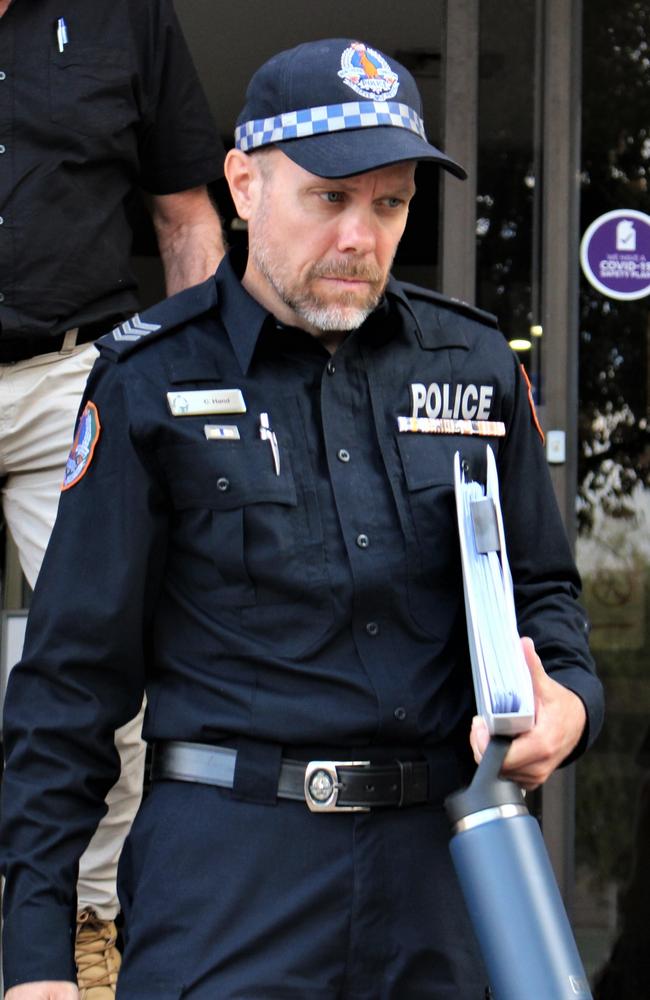Yuendumu shooting death ‘a result of brutal, structural, racial violence by NT Police’, court hears
Kumanjayi Walker’s death was the result of ‘brutal, structural, racial violence perpetrated by the NT government’, an expert report filed in the inquest into his fatal shooting has concluded.
Police & Courts
Don't miss out on the headlines from Police & Courts. Followed categories will be added to My News.
“The death of Kumanjayi Walker was the result of brutal, structural, racial violence perpetrated by the NT government through its police and health agents”, an expert report filed in the inquest into his fatal shooting has concluded.
Territory Coroner Elisabeth Armitage is holding an ongoing inquest in the Alice Springs Local Court into the 19-year-old Warlpiri man’s police shooting death in Yuendumu in 2019, now in its third week.
NT Police Constable Zach Rolfe was acquitted on all charges over the shooting by a Supreme Court jury in March.
On Tuesday, Sergeant Chris Hand told the court that when he informed Inspector Travis Wurst that Mr Walker had been shot by Constable Rolfe, the superior officer responded by arranging for backup from Darwin and Alice Springs.
“He realised that there were going to be significant tensions within the community,” he said.
“That they were going to be very angry and upset and violent, potentially towards police, or probably towards police, and having worked there and in other jurisdictions, he was concerned for our safety.”
Counsel assisting Patrick Coleridge read from an expert academic report filed with the court by the North Australian Aboriginal Justice Agency, putting the findings to Sergeant Hand “as a matter of fairness”.
Mr Coleridge said one of its conclusions was that “one way in which that systemic racism manifested itself” was through “an over-exaggeration by the NT Police of the level of threat posed to those officers by the community following the shooting”.
“The report concludes: ‘Overall, we find that the death of Kumanjayi Walker was the result of brutal, structural, racial violence perpetrated by the NT government through its police and health agents’,” he said.
In response, Sergeant Hand said from his experience “working with communities, and particularly in the central desert region”, he was worried about “traditional cultural payback” over the shooting.

“That night, that was one of the concerns that I had, that they obviously wanted answers, but some of the young men and perhaps even the older men, would want to mete out some sort of payback, because they were angry and upset as to what had happened,” he said.
“That night that was a real and present concern for me, given my experience working there and knowing of cultural payback occurring within the community when there’s a homicide of an Indigenous person by another Indigenous person.”
Lawyers for NT Police and the Health Department flagged objections to the admissibility of the report, but Ms Armitage said she would allow the questions “provided they don’t substantively go to those areas”.
On Monday, the court heard the police training phrase that loomed large during the trial of Constable Zach Rolfe but since disavowed by NT Police – knife equals gun – has been used by the force’s instructors for decades.
Sergeant Hand was one of two officers confronted by an axe-wielding Mr Walker three days before his death and began his evidence at the inquiry this week.
Sergeant Hand said his training in defending himself against edged weapons as a new recruit in 1995 involved creating a “reaction gap” or finding suitable “cover”.
“It was to do with when an offender’s armed with a knife and a certain level of distance that you need to create to have a suitable reaction because someone can come at you with a knife quite quickly,” he said.
“Use the verbal commands, dynamic verbal commands, to obviously tell the person to drop the weapons, identify yourself as a police officer if they don’t already know.”
But Sergeant Hand said the training also included “a phrase that was used of knife equals gun”.
“What that means is you can draw your firearm if you deem it necessary,” he said.
“It doesn’t mean that you have to draw your firearm but you do have that option because a knife can obviously be a lethal weapon if that person is in close proximity to you.”
Sergeant Hand said the phrase was used by instructors both during his initial recruit training and during requalifications since, but “it doesn’t automatically mean you draw your firearm if you see an edged weapon”.
In June, NT Police command issued a directive stating that the “erroneous belief or misconception” that “knife equals gun” would no longer form part of officers’ training.
It came after multiple serving police witnesses testified to having learned the phrase as recruits in giving evidence at Rolfe’s trial in February.
The inquest continues.




